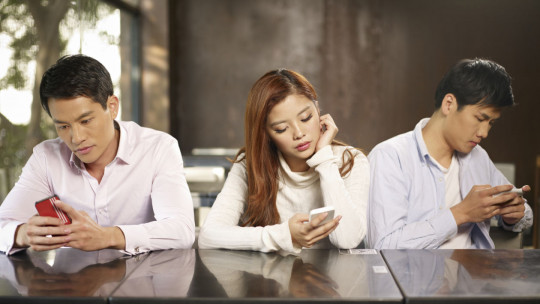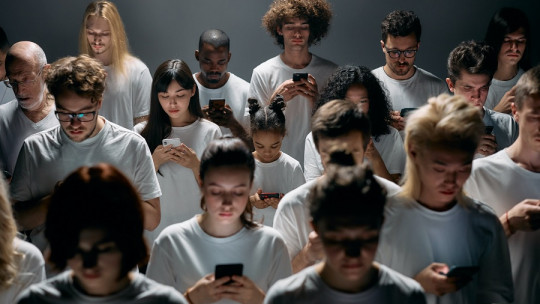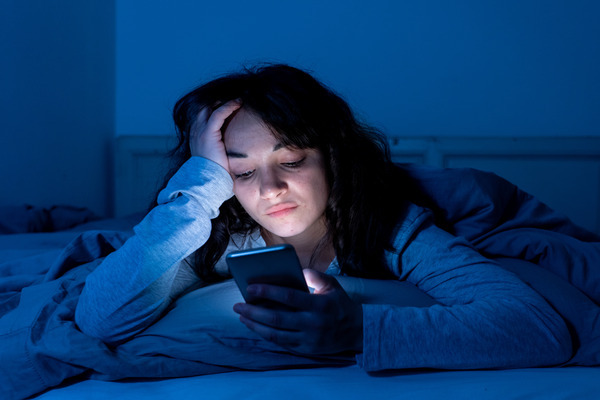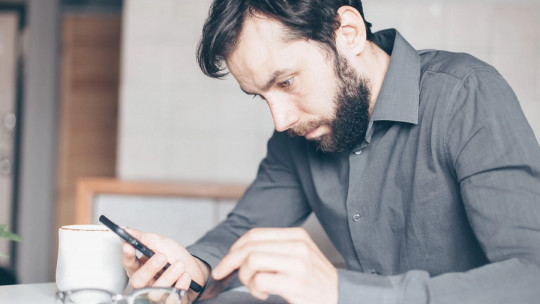Do you know what phubbing is? How does our cell phone addiction affect our relationships? Discover how to avoid phubbing and leave behind all the negative effects of mobile phones.

If I talk to you about “phubbing” You probably don’t know what I’m talking about. However, if I tell you: go to dinner and have the other person pay more attention to their cell phone than to you. This sounds more familiar to you, right?
What is phubbing?
Phubbing is a new term that has emerged in recent years as a result of the excessive dependence on mobile phone, even when you are interacting with other people. In this way even though the word phubbing is not part of a person’s daily vocabulary, it is very likely that this attitude is very present in your daily life. So much so that in our daily lives we can frequently see how our conversations stagnate in front of our friends or family due to the presence of the mobile phone.
Even though that him phubbing phenomenon It may seem harmless, research has discovered that cell phone use in our day-to-day conversations may be damaging our relationships.
What are the main problems of phubbing?
He phubbing It has consequences not only for the person but also for their closest circle. Mainly, the problems of phubbing for our mental health are the following.
1. Create dependency
The social networks They facilitate communication when it is difficult on a personal level, whether due to shyness or distance, and they encourage the social display of what is experienced. Positive reinforcement is received every time someone comments on a photo or comment or gives a “I like it” or retweet. That generates a feeling of well-being that can be addictive. There are even people who can sugarcoat or show a “mask”, that is, aspects of themselves that are not real.
One of the main phubbing problems is that because of this dependency, relationships can break up. In therapy I am starting to hear comments like: “He comes home at 8 p.m. and all he does is watch his cell phone while I take care of dinner” either ““I ask him how his day was and he answers in monosyllables while looking at his phone.”.
2. Generates distrust between people
New technologies are very useful for being in contact with your partner in a simpler and more immediate way, but it is a double-edged sword, since just as it facilitates communication, it can generate distrust and promote control. There are people who demand contact from their partner every few hours via cell phone and become desperate if that contact does not arrive and they see that the other is online or even if they are not online and have a justified reason such as working, there is no Taking a few minutes away from the other person to talk to yourself can be a cause of discussion when you get home.
There are many people who look at their partner’s cell phone, go on their wall or control the comments and “I like it” what they do and what they receive. They monitor who is watching their partner through social networks and even review the last connection times and compare them with the last connection times of other people. All this leads to obsession: “He is more aware of his friend than of me”, or “this girl likes everything my partner uploads” and that leads to the compulsion: looking at the phone more. There are even people who do not disconnect even if they go away on vacation. His great need is to find a place with Wi-Fi to connect and he does not enjoy the trip or the company.

3. Communication problems
Obviously these situations produce discussions that are also constant. People do not enjoy reality and focus on a parallel world that may seem wonderful but is destroying them day after day. As a consequence of all this, the relationship deteriorates, if there is no communication, there is mistrust and the time shared is not enjoyed, relationships can lead to a breakup that could be avoided.
This not only happens with couples, it also happens with friends. Seeing that there is someone who hangs out more with other people than with you, who comments on other people more than you or who likes another person more can generate jealousy and relationship problems. If, in addition, when the person stays, they are more aware of their cell phone than of you, this leads to a distancing or a confrontation that can end with the breakup of the friendship. On many occasions, these people will have relationship problems because of their cell phone.
4. Effects on self-esteem
He phubbing and social media addiction It has consequences on the self-esteem of people who suffer from it. In this way, in many cases, dependence on networks and seeking the attention and/or approval of others can affect the person’s self-esteem by not receiving what was expected.
In many cases, people who have this type of attitude on the networks and with their cell phones can end up feeling insecure in real life due to the reactions they have received through the device.
Signs of phubbing
To detect if you are really influenced by the phubbing phenomenon It is essential to try to visualize if you are hooked on your mobile phone. Mainly we can detect the following signs when someone suffers from phubbing.
1. You have two conversations at the same time
Normally people who suffer from pubbing They usually have two conversations at the same time, one in person and the other virtually. That is, while they are talking to others, they usually converse with other people through their cell phones.
2. You always have your cell phone in sight
Another of the effects of phubbing is that people tend to pay too much attention to their mobile phone wherever they are. So much so that they cannot lose sight of it due to their dependence on the device. On many occasions, those who suffer from phubbing tend to see their attitude around their cell phone as normal, when in reality it is not normal in the eyes of others.
3. You can’t eat without your cell phone
Using the cell phone while we eat is another of the clear phubbing signs People who tend to create this dependency with their cell phone have the need to attend to their device while eating.
4. They suffer from FOMO
FOMO (Fear Of Missing Out) or fear of missing out is another sign that you may be facing a problem. phubbing case On many occasions people have the need to resort to their mobile phone since they perceive that they can miss something very good if they are not constantly connected to the Internet.
These may be some of the signs that identify that you have a phubbing problem Although at first glance these ‘symptoms’ They seem harmless, the reality is that phubbing has many consequences for your life. That is why it is necessary to try to act on this attitude of dependency towards our mobile either through our own efforts or with the help of a professional psychologist.

How to act when faced with phubbing?
In order to stop this bad relationship that is established with the mobile phone, it is necessary to try to act on our daily habits. According to psychologists, we can change this attitude by doing the following.
-
Eat without your cell phone
The need to check our cell phone during meals is one of the strongest we can have. In this way, this will not only help you change your relationship with your cell phone, but you will also be able to enjoy and be aware of what you eat and what you eat.
-
Try to leave your cell phone when you go out whenever you can.
To go shopping it is not necessary to go with your cell phone. Nor is it when we go to throw out the trash or simply want to go for a walk in the park or the city. Sometimes the cell phone, despite being a very useful invention, does not help us enjoy the here and now, in these cases you can try to force yourself to leave it at home.
-
Record the hours you use your mobile
Using a record of the hours in which the mobile phone is used is one of the most effective ways to realize that perhaps there is a problem within us. In these cases we can realize the phubbing by counting (with the help of the mobile phone) the hours in which we use this device.
-
Discuss it with your circle
Sometimes we ourselves are not aware that we have a mobile addiction problem. Therefore, it may be interesting to discuss it with our closest loved ones. The people around us will be able to tell us if we really use our mobile device too much.
Let’s be aware of the world we live in and live that life instead of living in a virtual reality game. If you have identified with this post, awareness of the problem is the first step. Try to find a solution.
“I fear the day when technology surpasses our humanity. The world will only have a generation of idiots.”
Albert Einstein








